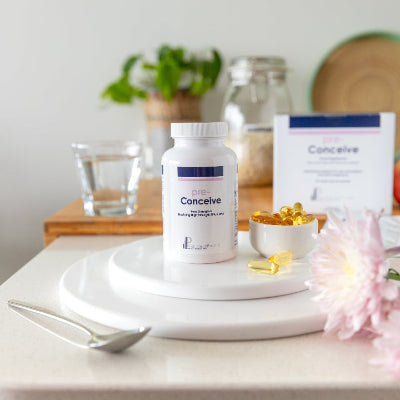Trying to conceive can feel like a complex puzzle, but understanding your menstrual cycle is one of the most empowering steps you can take on your fertility journey. A fertility calculator helps you identify your most fertile days, giving you the best chance of conception. And when paired with the right supplements, you can boost your cycle health and reproductive function even further. In this post, we’ll examine how fertility calculators work, the key phases of your cycle, and the role of supplements in supporting hormonal balance, egg health, ovulation, and implantation.
What Is a Fertility Calculator?
A fertility calculator (also called an ovulation calculator) estimates when you're most likely to ovulate - the release of an egg from your ovary - which is the time when you're most fertile. Fertile window = 5 days before ovulation + ovulation day itself. This tool uses the length of your cycle and the first day of your last period to predict when ovulation will occur, and therefore when you’re most likely to conceive.
Understanding Your Menstrual Cycle
To effectively use a fertility calculator, you need to understand the four key phases of your menstrual cycle:
- Menstrual Phase (Day 1–5) • Your period begins. • Hormone levels (oestrogen and progesterone) are low. • The uterus sheds its lining from the previous cycle.
- Follicular Phase (Day 1–13) • Begins on the first day of your period and ends at ovulation. • Follicle-stimulating hormone (FSH) promotes the growth of follicles (one will become the dominant egg). • Oestrogen rises, thickening the uterine lining in preparation for a fertilised egg.
- Ovulation Phase (Around Day 14 in a 28-day cycle) • Triggered by a surge in luteinising hormone (LH). • The mature egg is released from the ovary. • This is the peak fertile window.
- Luteal Phase (Day 15–28) • The ruptured follicle becomes the corpus luteum, which secretes progesterone. • Progesterone prepares the uterus for implantation. • If fertilisation doesn't occur, progesterone drops, and menstruation begins.
How to Use a Fertility Calculator
You’ll need:
- The first day of your last period
- Your average cycle length
Most calculators assume ovulation occurs 14 days before your next period. For example, in a 28-day cycle, ovulation likely occurs on day 14. However, everybody is different. If your cycles are irregular or you want more precision, consider using:
- Ovulation predictor kits (OPKs)
- Basal body temperature (BBT) tracking
- Cervical mucus monitoring
How Supplements Support Your Cycle
Targeted supplementation can help balance hormones, improve egg and sperm quality, support ovulation, and create a receptive uterine environment.
For the Follicular Phase:
🔹 CoQ10 Supports mitochondrial energy in developing follicles.
🔹 Vitamin B Complex Supports oestrogen metabolism and reduces cycle-related stress.
For Ovulation:
🔹 L-Arginine Improves blood flow to the ovaries and uterus.
🔹 Vitamin C & E Antioxidants that protect maturing eggs from oxidative stress.
🔹 Omega-3 Fatty Acids Helps regulate hormones and reduce inflammation.
For the Luteal Phase:
🔹 Vitamin D Boosts progesterone production and supports implantation.
🔹 Magnesium Supports progesterone, reduces PMS symptoms, and promotes relaxation.
Supplements for Men to Support Timing and Quality
Since male fertility contributes 50% of the equation, men can also time supplements with sperm regeneration (70–90 days) to align with the fertile window:
- Zinc (15–30 mg/day): Supports testosterone and sperm production
- Selenium (200 mcg/day): Improves motility and morphology
- L-Carnitine (1,000 mg/day): Boosts sperm movement
- CoQ10 (200 mg/day): Enhances sperm quality and DNA integrity
Final Thoughts
Using a fertility calculator is a smart, accessible way to understand your cycle and identify your most fertile days. But to truly support your body, combine timing with action, through proper nutrition, lifestyle habits, and targeted supplements. Whether you're trying to conceive naturally or preparing for IVF or IUI, tracking your cycle and supporting each phase with the right nutrients can improve your chances of a healthy conception.
Visit our ovulation calculator here.


